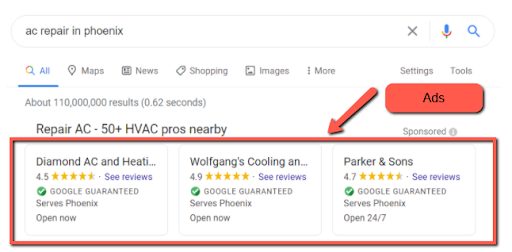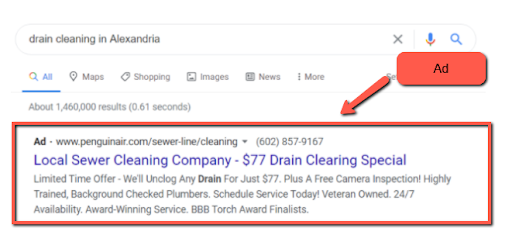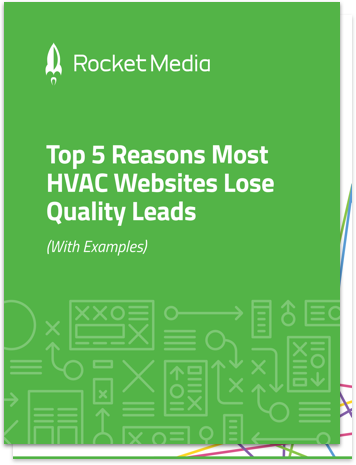How Does Paid Search Work?
on March 19, 2021
Paid search is a method of advertising where an ad gets displayed on a popular search engine like Google and Bing. It’s often distinguished from another form of online advertising, display advertising, which is advertising which appears on a website.
Now, if you own, manage or market for a home service company, you probably understand the basics of what paid search is. But when it comes to how it works? Yikes, no thanks. That’s pull-your-hair-out territory.
If you’re in this boat (you’re in good company...this topic is tough!) then you’ll want to read this blog. Because what we plan to do here is give you a no-nonsense beginners look at how paid search works, and just that.
Here’s what we’re looking at today:
What are paid search ads, and where do they appear?
How does paid search work?
What would I need to have today to start creating paid search ads?
And if you have any questions after this, don’t worry. We’ll have fresh blogs written up on the topic of how paid search works on a regular basis, and we’ll go a bit deeper down the rabbit hole each time.
Psst! If reading about how pay-per-click works isn’t your thing, we’ve got something even better!
If you don’t have time to read a bunch of how-to blogs about PPC, you’re in luck. Rocket Media is the type of agency that enjoys educating our clients about this marketing topic and many others.
Our experts don’t just keep you in the dark while they work their magic. They give you detailed insights into how your campaigns are operating. And unlike other agencies, we won’t hide your PPC expert behind an account manager. No way, Jose. You’ll have total access to the masterminds themselves.
What are paid search ads and where do they appear?
Anyone who’s spent time online knows that ads are everywhere. But we aren’t interested in the majority of ads online. We’re interested in just search ads which are ads that appearin search results on search engines like Google and Bing.
We’ll take a look at the most common search ads in the following section. Buckle up!
Where do search ads appear on a search result page?
Google has experimented with ad placement and the number of ads displayed for years. Ads have appeared at the top, bottom and along the side of organic search results at various points in Google’s history. Two of the most common types include sponsored ads and in-line ads.
Let’s look at these two types of ads in more detail.
Sponsored Ads
Here’s an example of one type of search ad, which is defined as “sponsored” by Google.

Companies in your local area which have achieved a “Google Guaranteed” badge will sometimes be displayed in the sponsored section. These are special paid advertisements which display essential company information like Google star rating, location and schedule.
In-Line Ads
You’re likely very familiar with in-line ads. They appear both above and below the actual organic search results after typing in a search query.

How does paid search work, anyway?
To understand how paid search works, we first need to know where ads come from. Here’s a brief summary of how that works:
A business signs up with an ad publisher (either Bing Ads or Google Ads)
The business creates an ad campaign and assigns criteria for each advertisement
The business publishes the campaign
Let’s take a look at these steps in more detail.
Step 1: Select the search engine you want to run ads on
The two most popular search engines, Google and Bing, are equipped with ad campaign managing systems (Google Adwords and Bing Ads, respectively). This is where your paid search journey starts.
Google AdWords and Bing Ads function almost identically. Google of course runs the largest paid search in the world, with as high as 90% of the world’s paid search traffic passing through their network. Bing, however, has been growing its network for years and shouldn’t be discounted.
Step 2: Determine the conditions for the ad to display
Campaigns ensure that ads only display when certain conditions are met (such as an exact match for a keyword or a specific time of day). While this is a huge topic in its own right, we’ll go over some of the most important conditions right now, which include:
Identifying keywords and setting a cost per click:
The Google Ads Keyword Planner lets you discover new keywords with ease, research how often keywords appear in search results and identify bid estimates for that particular keyword. Knowing more about bid estimates is especially important because it’s directly connected to your budget and how long your campaign will stay active.
Select a match type for each keyword:
Three match types can be considered when setting up ad groups within a campaign. This includes “broad,” “exact,” and “phrase.”
Broad: An ad will show up for every word within your keyword phrase.
Exact: The only search queries your ads will appear on are the ones with an exact phrase match.
Phrase: Your keyword phrase will be triggered by the specific keyword phrase you include, along with any queries which have that phrase.
Assign negative keywords to the campaign:
Negative keywords protect your campaign budget by further narrowing the type of queries which display your ads. For example, if someone types in “cheap ac repair” and you aren’t the type of business that performs “cheap” services, you can use “cheap” as a negative keyword and never appear in the search results when that word is added in.
Get even more granular:
There are dozens of additional criteria a business can use to achieve even more precision on who sees their ad. Ongoing study is the best way to fine tune each campaign and find out when, where and how your ideal customers interact with your ads.
Step 3: Publish the campaign, and then we wait!
From the moment a business publishes their ad campaign on Bing or Google, the entire process becomes automated. But it may be worth your while to understand a bit more about that process.
Here’s what happens after you publish an ad:
A prospective customer types a query into the search results. That query triggers the business’s advertisement.
However, before the business’s ad is displayed, the ad itself must first go to auction. If the business has a higher CPC than others bidding on the same keyword, then their ad will appear in the results.
The business is only charged for the ad if the prospect clicks on it (although a few variants exist on when a business is charged for the ad)
And that’s it! If the ad is successful, a click will occur and hopefully the customer will convert. If not, it’s important to try, try again, perhaps by directing customers to a different landing page, or improving the landing page with more persuasive writing and design.
What’s required to start your own paid search campaigns?
Judging from the last section, it becomes clear that a lot goes on behind the scenes for paid search to work. The good news however is that you only need two things to start a paid search campaign:
An account with Google Ads, Bing Ads or both.
A defined budget (how much you’re willing to spend per month on search advertising)
And that’s it! There is nothing stopping you from displaying ads on Google or Bing today if you wanted to. The vast majority of the complexity happens behind the scenes, and ad publishers have an incentive to keep it that way. The more people that publish ads on their networks, the more money they make.
Overwhelmed by paid search? Call Rocket Media!
Learning about paid search without any support or help isn’t easy. You’ve got other marketing jobs besides this one. And some of you have a whole home service business to run!
If you’re feeling overwhelmed and don’t know where to start, Rocket Media can help. Our PPC experts have been running PPC campaigns for HVAC, plumbing, electrical, solar and other home service businesses since 2003. And they’re always willing to help you learn more.

